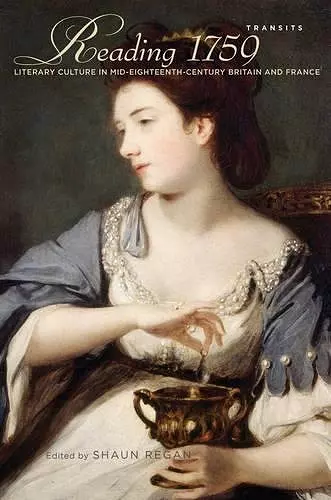Reading 1759
Literary Culture in Mid-Eighteenth-Century Britain and France
Format:Hardback
Publisher:Bucknell University Press
Published:16th Nov '12
Currently unavailable, and unfortunately no date known when it will be back
This hardback is available in another edition too:
- Paperback£46.00(9781611485936)

Reading 1759 investigates the literary culture of a remarkable year in British and French history, writing, and ideas. Familiar to many as the British “year of victories” during the Seven Years’ War, 1759 was also an important year in the histories of fiction, philosophy, ethics, and aesthetics. Reading 1759 is the first book to examine together the range of works written and published during this crucial year. Offering broad coverage of the year’s work in writing, these essays examine key works by Johnson, Voltaire, Sterne, Adam Smith, Edward Young, Sarah Fielding, and Christopher Smart, along with such group projects as the Encyclopédie and the literary review journals of the mid-eighteenth century. Organized around a cluster of key topics, the volume reflects the concerns most important to writers themselves in 1759. This was a year of the new and the modern, as writers addressed current issues of empire and ethical conduct, forged new forms of creative expression, and grappled with the nature of originality itself. Texts written and published in 1759 confronted the history of Western colonialism, the problem of prostitution in a civilized society, and the limitations of linguistic expression. Philosophical issues were also important in 1759, not least the thorny question of causation; while, in France, state censorship challenged the Encyclopédie, the central Enlightenment project. Taking into its purview such texts and intellectual developments, Reading 1759 puts the literary culture of this singular, and singularly important, year on the scholarly map. In the process, the volume also provides a self-reflective contribution to the growing body of “annualized” studies that focus on the literary output of specific years.
This volume offers fine essays devoted to the pivotal year 1759, a time when Britain emerged as a world power to be reckoned with and when the British literary scene exploded with a collateral force. Regan (Queen's Univ., Belfast) divides the collection into six sections, treating the literature of empire and war, sentimentality, authorship, the Enlightenment, the notion of authorial originality, and the "culture of reading." The volume treats major writers, including Samuel Johnson, Voltaire, Diderot, Adam Smith, Edward Young, Oliver Goldsmith, Christopher Smart, David Hume, Laurence Sterne, and Sarah Fielding. Reading 1759 offers a superb, cogent introduction to mid-18th-century literary culture, covering much important ground and opening up new prospects for future investigation. Summing Up: Recommended. Upper-division undergraduates through faculty. * CHOICE *
Reading 1759 nevertheless provides interesting insights into a number of notable works and authors and makes a useful contribution to Bucknell University Press’s Transits: Literature, Thought & Culture 1650-1850 transnational eighteenth-century studies series. . . .[S]cholars will find new perspectives on the texts and authors that distinguished 1759’s contributions to literary history. * The Eighteenth-Century Intelligencer *
Reading 1759 calls attention to an interesting and pivotal moment in British and French history and reading culture by bringing together eleven essays on different aspects of the literature of that year. As Shaun Regan explains in his introduction to the volume, the year 1759 is particularly suited for this kind of cross-disciplinary study because it was the midpoint of the Seven Years’ War and was marked by cultural events such as the public opening of the British Museum, as well as the publication of major literary works by Voltaire, Samuel Johnson, Laurence Sterne, David Hume, Adam Smith, and Edmund Burke (1–2). By encompassing the literature of both Britain and France, Reading 1759 invites a more transnational approach to literature that better approximates what readers at the time could have experienced. Regan explains that 'the purpose of the new essays collected together in Reading 1759 is to investigate the literary culture of Britain and France during this remarkable year' (2). Taken as a whole, the volume does this quite well. . . .Reading 1759 offers an overview of major authors and works from this year of literary, historical, and cultural change. * Eighteenth-Century Fiction *
ISBN: 9781611484786
Dimensions: 236mm x 160mm x 24mm
Weight: 540g
246 pages